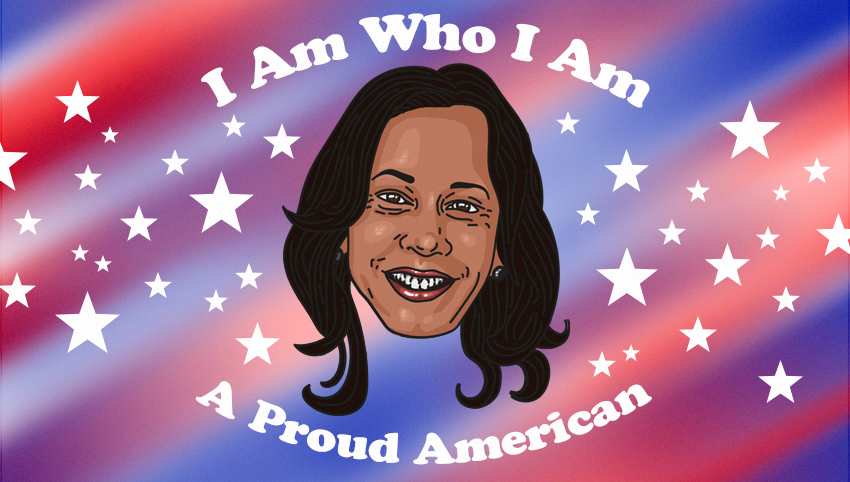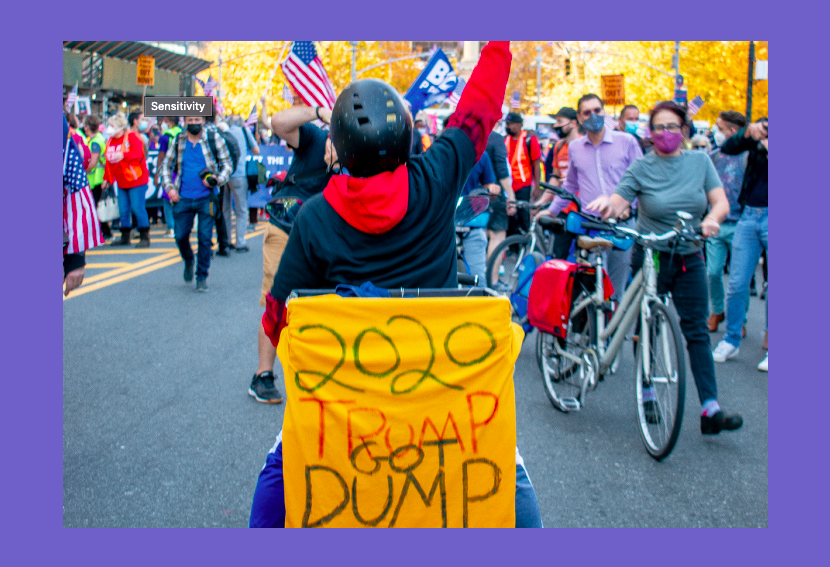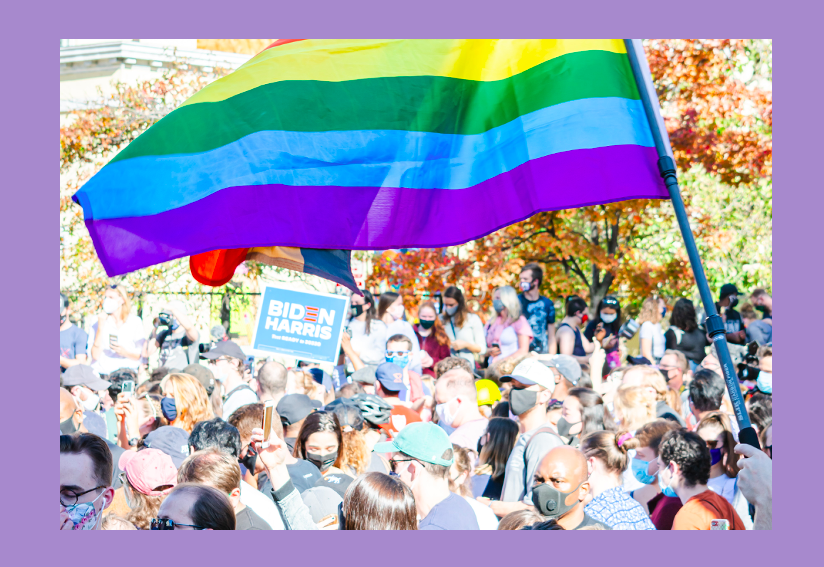KAMALA HARRIS: HOPE FOR AMERICA YET?
A deeper dive into the new vice-president of the United States
By Isobel McCarthy / 24 November 2020

Illustration by Jade Pughe
Just over two weeks ago, President Donald Trump and Vice President Mike Pence were comfortably sitting in office - the same cannot be said now. By January 2021, there will be a completely different scene in the White House as Joe Biden and Kamala Harris take office.
The news coverage on Harris has been simple. She is a woman, African American (being of Jamaican ancestry) and South Asian American (Indian Tamil), which in itself will go down in history as a poignant moment for both sexual and racial equality. Yet, as ever, these markers appear to come before her success as a politician. Her path to the highest office in the nation has crashed through glass ceilings: the first Black woman to become San Francisco's and California’s top prosecutor, and the second Black woman to become a senator.
Growing up, Kamala and her sister Maya were raised by their mother, Shyamala Gopalan Harris, a cancer researcher and civil rights activist. In Harris’ autobiography, she explained how her “mother knew she was raising two Black daughters”, who would both, unfortunately, grow up to experience racism. Harris has repeatedly referred to her degree from Howard University and her association with Alpha Kappa Alpha (the nation’s oldest Black sorority). This has developed closer ties with the African American population, which will undoubtedly strengthen Biden’s presidency to an extent that Trump was unable to.
However, Harris doesn’t antagonise over her identity, stating that “I am who I am – a proud American” and vows to “not be the last” female to reach the landmarks. Harris’ rhetoric, beliefs and subsequent actions encompass even more than her ethnicity and sex. As a daughter to a civil rights activist and stepmom to her husband’s two children, she has mobilised her voice into a powerful tool by expressing dissatisfaction to unjust aspects of American democracy.

Photo by Rom Matibag on Unsplash
Climate Change
There has been, on occasion, evidentce of Harris' progressive attitude towards climate change. As San Francisco's district attorney she created an environmental justice unit and as California attorney general she confronted the fossil fuel industry, opposing a Chevron refinery expansion in Richmond. We can expect to see the same attitudes towards climate change throughout Biden’s presidency. During the Presidential race, Harris made clear that Biden’s administration would re-join the Paris Agreement. As a natural orator, operating with ease, she admitted that climate change is “an existential threat” to humans and subsequently a socio-political crisis. This is in stark contrast to Trump’s view of it being a ‘myth’.
LGBTQ+ and Transgender Rights
However, Harris' activism has not always existed in her attitudes towards trans rights and the LGBTQ community. Positive elements of her tenure as Senator came in 2018 when she introduced the Census Equality Act. The act aims to incorporate the 10 million LGBTQ American citizens accurately into census data. Harris claimed that the “spirit of the census is that no one should go uncounted and no one should be invisible”. Whilst she is a regular at San Francisco’s gay pride annual event and officiated California’s first same-sex marriage saying it was ‘about time’, she has been controversial and unsupportive towards trans issues.
Most notably, in 2015, Harris blocked gender-affirming medical care for trans women in prisons. Michelle-Lael Norsworthy – a trans woman detained in a Californian prison petitioned for prison officials to grant her request for gender surgery. As California’s attorney general, Harris dealt with Norsworthy’s case by arguing that there is no evidence for immediate surgery. Whilst Harris (in 2019) took responsibility for her decision, it has undoubtedly affected her relationship with the trans community, evidenced by reactions from LGBTQ+ accounts on Twitter.
Similarly, Harris has received widespread criticism over her criminalisation of sex work. She justified her decision arguing that sex work facilitates the spread of HIV. As a result, Harris backed FOSTA/SESTA – a 2018 package of bills that aimed to permanently close sites used by sex workers. For many, especially transgender sex workers, decriminalising sex work was wholly unsupportive and a blatant infringement of their rights. This is because the measures supported by Harris would wipe out critical “screening tools” that they deemed essential to stay safe. According to data from the National Transgender Discrimination Survey, roughly 13% of the community have participated in the sex industry, exacerbated by employment discrimination. Therefore, for many transgender citizens, it felt like Harris was singling them out and neglecting to recognise the importance of keeping this space safe.
It is fair to say that Harris has been inconsistent in her attitude towards the LGBTQ+ community. For many, she has a long way to go. Courtney Trouble, a non-binary trans sex worker feels that Harris has “ignored an entire facet of a community who could be her supporters”. Furthermore, Monica Roberts, a prominent Black trans advocate, questioned what more Harris can do to prove herself. Time will tell, but there is hope for the community as Harris has acknowledged her mistakes.

Law Enforcement Reforms
Whilst Harris is broadly aligned with the Democrat party in supporting law enforcement reforms, not all of her work has been viewed favourably. In a 2018 Senate hearing, conservatives were outraged when Harris closely compared the Ku Klux Klan to Immigration and Customs Enforcement. To make matters worse, Harris’ track record on prisons is complicated, to say the least. She has repeatedly defied supreme court orders to reduce overcrowding in prisons and has come under fire for her approach to marijuana offences. Statistics from the California Department of Corrections and Rehabilitation (CDCR) show that at least 1,560 people were jailed for marijuana offences during Harris’ time as California state attorney general from 2011 through to 2016. Her prison-related judicial decisions resurfaced during the American Presidential election – as seen through a Facebook post shared more than 200,000 times since October 8, 2020. Whilst The New York Times defines her as a pragmatic moderate; Fox News calls her a radical. But Harris describes herself as a “progressive prosecutor” who may win some and lose some.
Biden and Harris
Despite this, Kamala Harris is undoubtedly a determined woman who should be commended for her resilience in sticking by her beliefs – a trait that Biden respected. Biden was able to overlook the criticism he received from Harris last year during the Democratic primary race when she addressed his prior opposition to mandated bussing – a policy that would have desegregated schools in the 1970s. Surely, Biden can see the advantage of having a force like Harris in office. She is a historic victory for equitable representation, liked by Democratic donors, has mobilised the African American voters without alienating the median voter theory and will enhance Biden’s overall presidency through her progressive attitude. Similarly, Harris is willing to overlook Biden’s past gaffes and mistakes because she too is guilty of slipups.
The next 4-year term with Biden will certainly be one to watch. Whilst Harris is not a perfect politician, no one is. A huge proportion of the population can relate to Harris’ struggles as a woman attempting to make it in the world. We shouldn’t overlook her questionable views from the past, but she is a breath of fresh air and a step in the right direction for America and come 2024, the world could be seeing the first female American President.
Art by
Words by
Share this article

